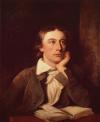Quotes by John Keats
Nothing ever becomes real till it is experienced -- even a proverb is no proverb to you till your life has illustrated it.
Thou, silent form, dost tease us out of thought / As doth eternity: Cold Pastoral!
The automobile changed our dress, manners, social customs, vacation habits, the shape of our cities, consumer purchasing patterns, common tastes and positions in intercourse
The only means of strengthening one's intellect is to make up one's mind about nothing -- to let the mind be a thoroughfare for all thoughts.
The imagination of a boy is healthy, and the mature imagination of a man is healthy but there is a space of life between, in which the soul is in a ferment, the character undecided, the way of life uncertain, the ambition thick-sighted thence proceeds mawkishness.
Tis the witching hour of night, Orbed is the moon and bright, And the stars they glisten, glisten, Seeming with bright eyes to listen For what listen they
When I have fears that I may cease to be, Before my pen has glean'd my teeming brain.
Much have I travell'd in the realms of gold, And many goodly states and kingdoms seen; Round many western islands have I been Which bards in fealty to Apollo hold. Oft of one wide expanse had I been told That deep-brow'd Homer ruled as his demesne; Yet did I never breathe its pure serene Till I heard Chapman speak out loud and bold: Then felt I like some watcher of the skies When a new planet swims into his ken; Or like stout Cortez when with eagle eyes He star'd at the Pacific--and all his men Look'd at each other with a wild surmise-- Silent, upon a peak in Darien.
O for a life of sensations rather than of thoughts!
Poetry should please by a fine excess and not by singularity. It should strike the reader as a wording of his own highest thoughts, and appear almost as a remembrance.
The excellency of every art is its intensity, capable of making all disagreeable evaporate.
Poetry should surprise by a fine excess and not by singularity --it should strike the reader as a wording of his own highest thoughts, and appear almost a remembrance.
What men or gods are these? What maidens loth? What mad pursuit? What struggle to escape?...
The Public - a thing I cannot help looking upon as an enemy, and which I cannot address without feelings of hostility.
The problems of the world cannot possible be solved by skeptics or cynics whose horizons are limited by the obvious realities. We need men who can dream of things that never were.
Real are the dreams of Gods, and smoothly pass / Their pleasures in a long immortal dream.
Are there not thousands in the world who love their fellows even to the death, who feel the giant agony of the world, and more, like slaves to poor humanity, labor for mortal good?
I love you the more that I believe you have liked me for my own sake and for nothing else.
Don't be discouraged by a failure. It can be a positive experience. Failure is, in a sense, the highway to success, inasmuch as every discovery of what is false leads us to seek earnestly after what is true, and every fresh experience points out some form of error which we shall afterwards carefully avoid.
Should ever the fine-eyed maid to me be kind; Ah! surely it must be whenever I find; Some flowery spot, sequestered, wild, romantic; That often must have seen a poet frantic.
I am certain of nothing but the holiness of the heart's affections and the truth of imagination. What the imagination seizes as beauty must be truth - whether it existed before or not.
Poetry should be great and unobtrusive, a thing which enters into one's soul, and does not startle it or amaze it with itself, but with its subject.
If I should die, I have left no immortal work behind me - nothing to make my friends proud of my memory - but I have loved the principle of beauty in all things, and if I had had time I would have made myself remembered.
Beauty is truth, truth beauty. That is all ye know, and all ye need to know.
O for a life of Sensations rather than of Thoughts.






